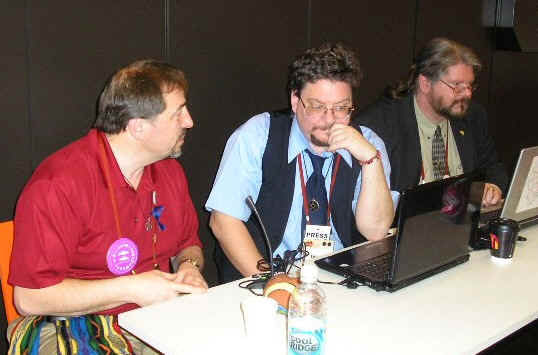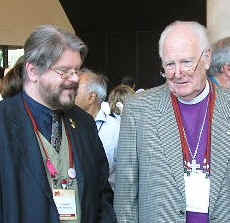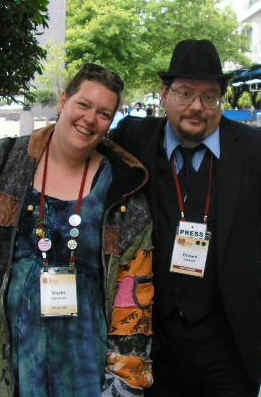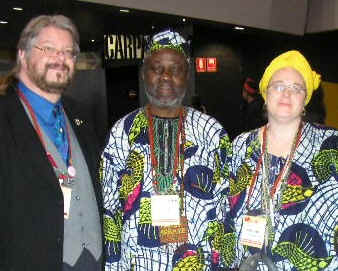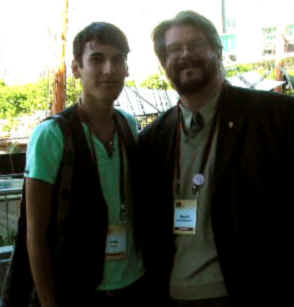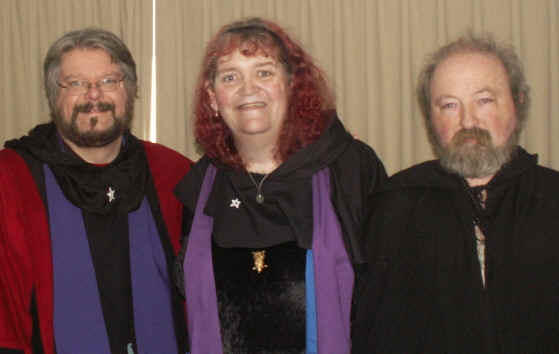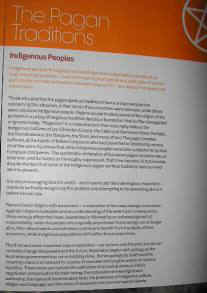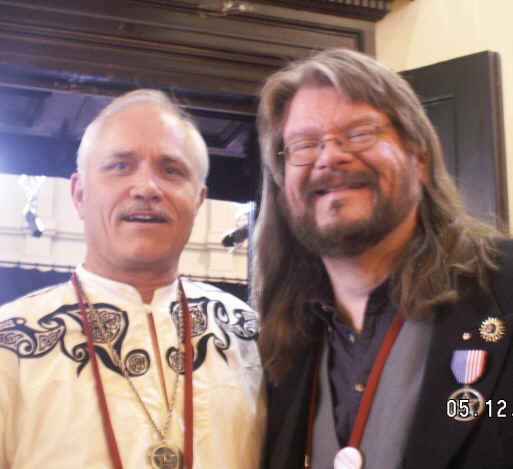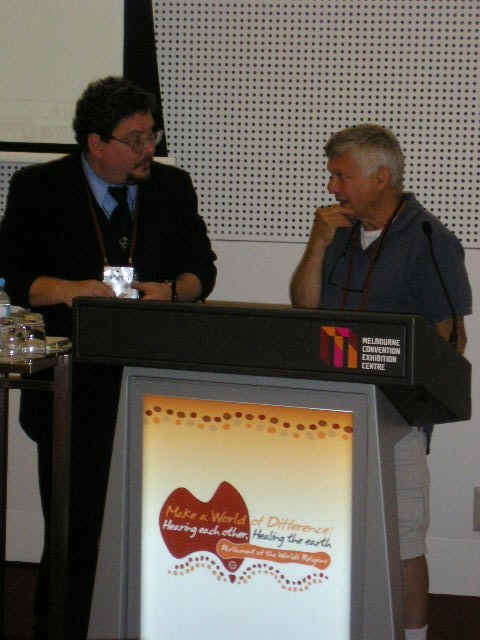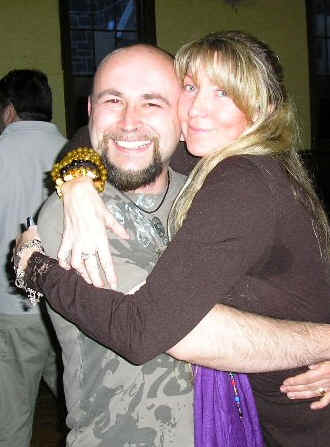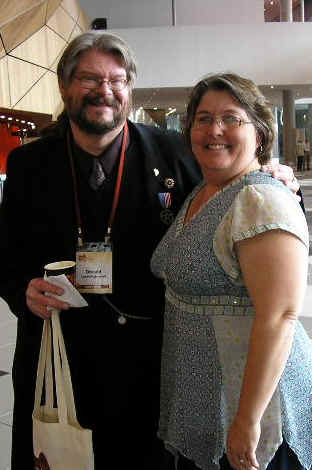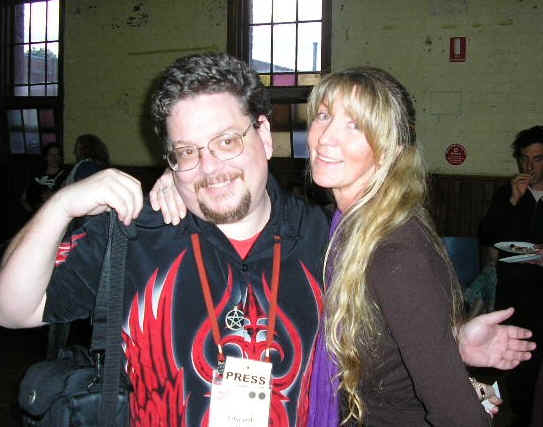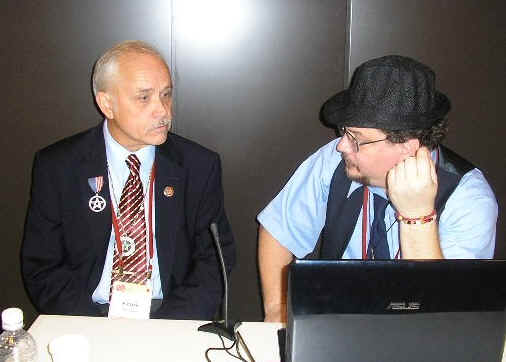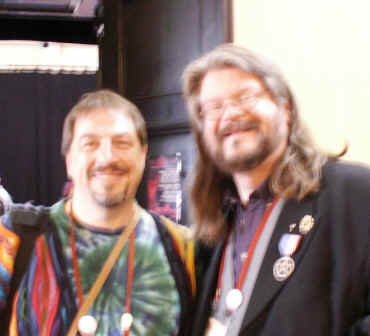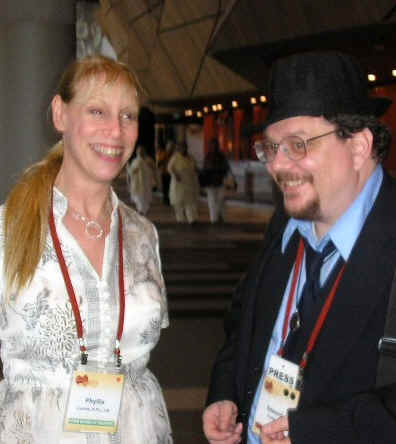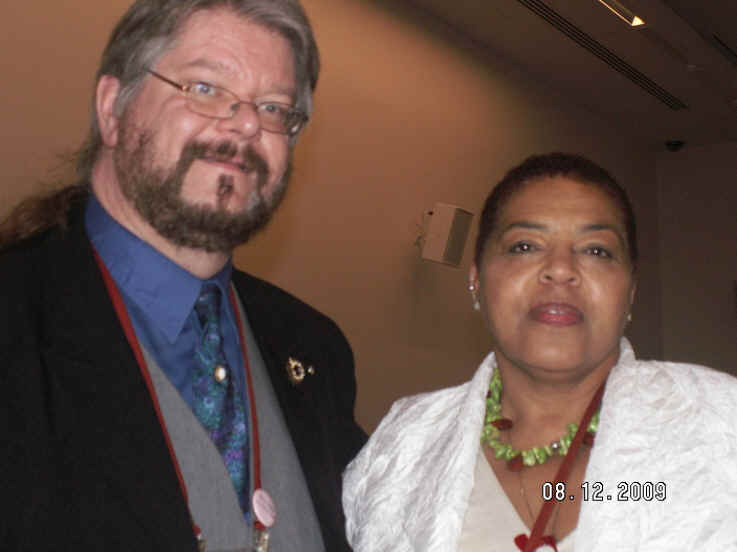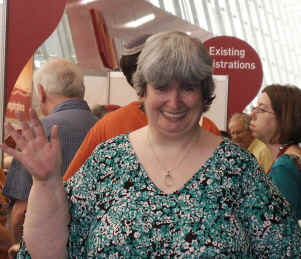What I Learned
At The Parliament
A Report From The Chancellor
17 December, Year 9 Aquarius / 2009 AD
17 December, Year 9 Aquarius / 2009 AD
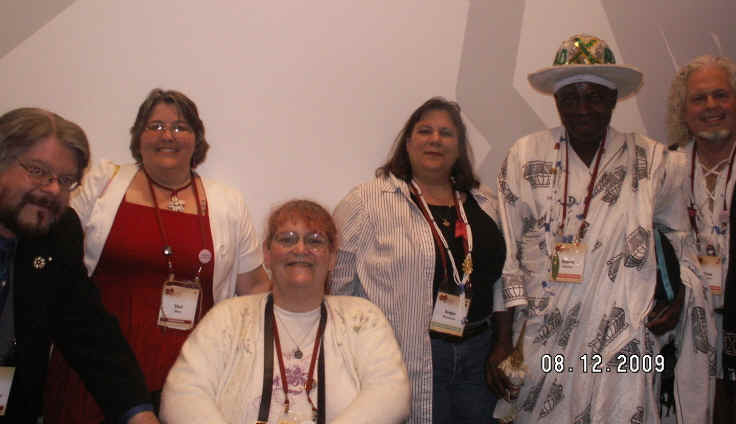
At the Parliament of the World's Religions, L to R, M. Rev. Don Lewis, Rev. Shel Skau of Circle, Rev. Olivia Watts, HP, Rev. Angie Buchanan of Gaia's Womb, a Trustee of the Parliament, His Majesty the King of Benin (representing African Vodun at the PWR), and Drake Speath. Photo courtesy of Olivia Watts.
Greetings everyone,
As you may know Ed and I recently attended the Parliament of World’s Religions in Melbourne, Australia. This was a remarkable event and I will always remember it –especially the wonderful people I met: Rev. Citrine, Rev. Olivia Watts, and Rev. Wendy Kear, Krystie Lees-Smith, Gavin Andrew, Belinda and Helen, Gede Parma, Rick Kearsley of Spiral Dance, Badger, and many other lovely people! Then there were the old friends I got to see again –Angie Buchanan, River Higginbotham, Shel Skau, Shé d’Montford, and Wendy Rule to name only a few. And then of course there were the many other religious leaders I was privileged to meet and network with! It was a wonderful and very productive week!
As you may know Ed and I recently attended the Parliament of World’s Religions in Melbourne, Australia. This was a remarkable event and I will always remember it –especially the wonderful people I met: Rev. Citrine, Rev. Olivia Watts, and Rev. Wendy Kear, Krystie Lees-Smith, Gavin Andrew, Belinda and Helen, Gede Parma, Rick Kearsley of Spiral Dance, Badger, and many other lovely people! Then there were the old friends I got to see again –Angie Buchanan, River Higginbotham, Shel Skau, Shé d’Montford, and Wendy Rule to name only a few. And then of course there were the many other religious leaders I was privileged to meet and network with! It was a wonderful and very productive week!
I want to thank everyone who contributed to help support this trip! Because of your help we raised nearly $1000 to help defray the $6000 cost of the trip. Your contributions were a great help, and without that help we might not have been able to do this –so thank you very, very much!
|
So what did I learn at the Parliament?
Ed has been to the Parliament before, but for me this was my first time attending. I knew the Parliament was important, but I really had only a partial understanding of what to expect. From this trip I gained a clearer understanding of what the Parliament is about and why it is so important that we have a presence there and in the interfaith movement in general. |
|
The Parliament of the World’s Religions is called the “Olympics of Religion”. People from all over the world attend. You might imagine that it is a highly spiritual event –and there is certainly a great deal of spirituality in and around the event. But the Parliament is as much a political as a religious event. Religious leaders and believers from nearly every religion not only share their views and opinions –they also set opinions. These thousands of people, many of whom carry great importance in their home communities, take back with them the opinions and understandings they gain at the Parliament, and integrate them into their communities –just as I am doing now. In many cases these opinions and understandings then become part of the official or semi-official policies of those religions, which in turn influence the policies and practices of various governments.
In other words, the Parliament has a huge -unofficial and essentially informal- influence on civil policy and law because the people who attend it and whose opinions are affected by it have a huge effect in these areas. Political opinion is strongly influenced by religious opinion: religious opinion is strongly influenced by the Parliament. |
|
As a result political positioning, political networking, and political relationships are a major aspect of the Parliament. How religions perceive each other, how religions treat each other, and how religions position each other are strongly affected by this event –and by the wider interfaith movement of which the Parliament is the pinnacle.
This is why the Parliament is so important, and why it is so important for us to be there. If we as Correllians wish to have an affect on law and policy, then we must be here -for the Parliament is in many cases the nascence of policy and consequently of law. |
|
An example of this is the changing use of the word “Pagan”. Traditionally “Pagan” has been a term applied mainly by Christians to followers of all non-Abrahamic religions. A few of those religions –such as ours- also used the term because it emphasized the similarities between our disparate faiths and underlined the idea that under our superficial differences we are all working with the same spiritual realities. As an umbrella term “Pagan” allowed a wide coalition to make common cause. Not everyone who came under the term “Pagan” liked being designated as Pagan, but it was widely accepted even as recently as the last Parliament.
|
|
Now however many of those religions which have been traditionally considered “Pagan” have rejected the term as a Christian interpolation and an aspect of colonialism. At the Parliament I had occasion to speak to a number of Hindu, African, and Native American leaders who laid out very clearly exactly why they feel this way, and why they feel that the term “Pagan” can never overcome the pejorative connotations it carries. I found that this rejection is pretty much global. So as an umbrella term, “Pagan” is pretty much dead.
|
|
However the term “Pagan” was not absent from the Parliament. Instead “Pagan” was presented as the “Indigenous Religions of Europe” –a much smaller and more limited definition. Now this is not a completely new definition –a small minority has used this definition for years, but it was understood as a minority opinion. Now however, with the power of the Parliament endorsing it, it is effectively the dominant opinion. All those religious delegates attending the Parliament –over ten thousand of them, including a number at the very highest levels of their respective religions- will return home with this definition as THE definition, and it will effectively be un fait accompli. Indeed, is un fait accompli. That is the power of the Parliament.
|
|
As presented at the Parliament the term “Pagan” now refers to indigenous European Traditions such as Asatru, Druidism, Romuva, and a variety of Familial Traditions. Modern syncretic movements such as Wicca and Isianism would be classed as “New Religious Movements”. |
So which are we? Are Correllians an Indigenous Religion of Europe or a New Religious Movement? Although one doesn’t know if it still holds true now that everyone has returned home and a week has passed, at the Parliament it was made clear to me that as an outgrowth of a Familial Tradition Correllianism absolutely could be classed as an Indigenous Religion of Europe (notwithstanding that our familial origin is ethnically and culturally mixed).
Now I have been fighting for the recognition of the Familial Traditions for much of my life. I am sure you know that there are many who effect to deny that the Familial Traditions even exist. Indeed, it gives me great pride to see the Familial Traditions in a policy setting position at the Parliament. So you can imagine how surprised I am to find myself taking the position that Correllianism falls under the New Religious Movement heading.
Now I have been fighting for the recognition of the Familial Traditions for much of my life. I am sure you know that there are many who effect to deny that the Familial Traditions even exist. Indeed, it gives me great pride to see the Familial Traditions in a policy setting position at the Parliament. So you can imagine how surprised I am to find myself taking the position that Correllianism falls under the New Religious Movement heading.
|
Correllianism is a multi-ethnic and multi-cultural movement with members on every continent. We are a global Tradition which has grown far beyond our Familial roots (which were multi-ethnic and multi-cultural to begin with) and now circles and embraces the world. We are open to people of any race, any culture, and our members are free to adapt Correllianism to their needs. These things sound so simple, so familiar –and yet among the organized Traditions they are virtually unique. These things are our strength. They are what make us a truly modern, even revolutionary model. We are Wicca for all people.
This brings me to the second thing I learned at the Parliament: how unique we are as Correllians, and why we need to embrace that uniqueness. |
|
We –the Correllian Tradition and our educational partner Witch School- were and are extremely proud that we could present our materials at the Parliament in nineteen languages!
THANK YOU TRANSLATORS! Thanks to your hard work and dedication we were able to present materials in Afrikaans, Bahusa, Chinese (Traditional and simplified), Croatian, Dutch, English, French, German, Greek, Hebrew, Italian, Xhosa, Polish, Portuguese, Romanian, Serbian, and Spanish! Now there were other Wiccan and European Pagan groups claiming international memberships at the Parliament, but do you think there was anything similar to this? No. I don’t think there was even an understanding of why we thought it was important. |
|
Why is it important? It is because these are not languages that we just went out and translated our materials into so that we could attract people who happen speak those languages –these are materials translated by our members who DO speak these languages. And those members are not translating materials from a “foreign” Tradition that they have joined, but from THEIR OWN Tradition -for the Correllian tradition belongs to all places and peoples equally. We are not a British Tradition, or an American Tradition, or a European Tradition –we are a global Tradition. Correllianism is not about any one race or ethnicity or nation or even culture –it is for everyone who wants it, and it is equally at home anywhere on Earth (and beyond Earth for that matter, when humanity eventually expands into space).
|
|
There was nothing remotely like these materials among the other Wiccans and Pagans at the Parliament, because there is nothing remotely like us. This is perhaps the most important thing I learned at the Parliament -that the global, multi-ethnic, multi-cultural quality of Correllianism is unique and that we must embrace and emphasize it more strongly than ever before. We are a Modern Religion. We are a World Religion. We should embrace this and be proud of it!
|
The third thing I learned at the Parliament is that as a movement Wicca –Correllianism included- really needs to make an effort to get out of itself and be more involved with our fellow humans. Our religion emphasizes introspection as an important aspect of personal growth, but introspection can also become obsession or narcissism if not balanced with action. We see obsession and narcissism in our community all too clearly –the constant fights and Witch Wars which never achieve resolution or build anything positive, and yet which cannot seem to be gotten beyond, the constant personality clashes which could be avoided by little more than good manners and a bit of patience. Watching the other religions at the Parliament really reminded me of the importance of putting belief into action, and of involving ourselves with our fellow people.
|
All of the major religions at the Parliament have campaigns and charities of various sorts that are dedicated to helping other people and the Earth in general. Some of these are more effective than others, some are more sincere than others, but they all make an effort. To give just one example, a traditional part of Jain practice is providing meals at Temple which are open to anyone who wishes to come and eat, Jain or not.
|
|
Now we have many charitable people who give generously and work to help others and to help the world as a whole. But in most cases circumstances compel them to channel their efforts through the organizations maintained by religions other than our own. If we are truly to take our place as a world religion, this is one aspect we will need to work to improve. We need to find those ways in which we can uniquely enrich the world and be of benefit to all people, and we need to start standing under our own flag when we work to help others.
|
|
I am therefore at this time officially asking for ideas and potential organizers to help create uniquely Wiccan, uniquely Correllian ways of helping others. Ways in which we can work to make the world a better place and improve the lot of others. This doesn’t have to be in terms of feeding and clothing people –though there is always a need for that. Other possibilities include tree planting campaigns, ongoing nature clean-up campaigns, or the creation of educational resources. One of the most important facets of our faith which is also among the least emphasized is acting as preservers, expanders, and disseminators of knowledge. There are many possible ways in which we as a community can reach outside of ourselves and help improve the world and improve our relations with others –let us see what we can develop!
|
And finally I learned one other, rather darker thing at the Parliament of World’s Religions. For all the talk about spirituality, indigenous rights, and charitable activities, I never heard a single word about the Witch persecutions going on in Africa. As you no doubt know Africa is in the grip of a Witch persecution that strongly resembles that of Europe’s “Burning Times” –except in Africa the larger proportion of the victims of this persecution are children. These “Witch Children” are beaten, tortured in often horrible ways, exiled from their homes and communities, and sometimes killed all because they are believed to be “Witches”. This persecution is being perpetrated on a number of fronts, but is largely coming from Protestant churches, many of which are funded from the US. This is what made Sarah Palin’s acceptance of a spiritual endorsement and blessing from African Witch Hunter Bishop Thomas Muthi so objectionable during the recent US election.
Among all the religious leaders at the Parliament I did not hear a single mention of this expanding human tragedy. Not a mention among the Christians. Not a mention among the Africans. Not a mention among the Pagans.
Among all the religious leaders at the Parliament I did not hear a single mention of this expanding human tragedy. Not a mention among the Christians. Not a mention among the Africans. Not a mention among the Pagans.
|
What this tells me is that if anything is going to be done about this it is going to have to be us who do it. Not that there aren’t agencies that are helping the Witch Children –there are. But I mean in terms of world opinion, in terms of educating people to see that this is not acceptable, in terms of bringing in the pressure of public opinion to stop those US churches that are financially supporting and in many ways creating this situation. And so here too I am officially asking for ideas and potential organizers to try to create ways of raising public awareness about the African Witch Hunts and work on ways in which we might be able to turn the tide. Because I see all too clearly that if we do not, no one else is going to.
|
|
So to sum up: What did I learn at the Parliament? I learned that the Parliament and the Interfaith Movement of which is part are a very powerful and influential movement in which we as Correllians must have a presence if we wish to have a voice among the worlds religions, and if we wish to have a hand in the shaping of world religious policy. I learned that as a Tradition we Correllians are in some ways distinctly different from others we have always considered similar, and that this difference –which is our embrace of the multi-cultural global present and future instead of the insular past- must be nurtured and strengthened. I learned that if we as Correllians want to see a better world then we must be prepared to build it ourselves –as evidenced by the Witch crisis in Africa- and that while we have many generous and charitable people who work hard to build a better world as a Tradition we desperately need to develop ways to help them do it.
|
These are valuable lessons and I am grateful for them. I hope that you will help me in to embrace and implement these lessons to build a better future for all of our people, and indeed for all people.
Blessings to all,
Rev. Don Lewis
First Priest and Chancellor
Correllian Tradition
Blessings to all,
Rev. Don Lewis
First Priest and Chancellor
Correllian Tradition

